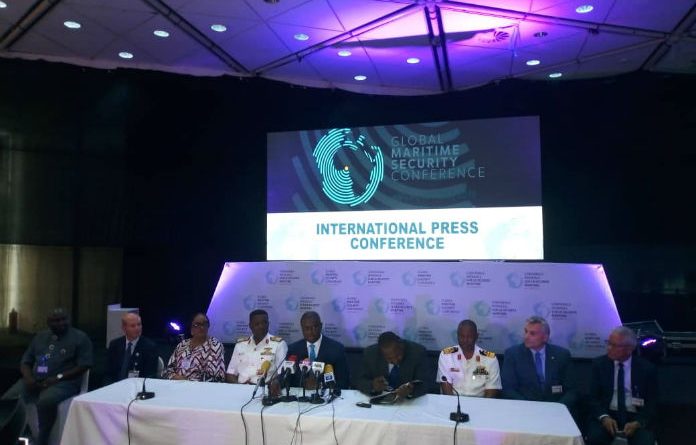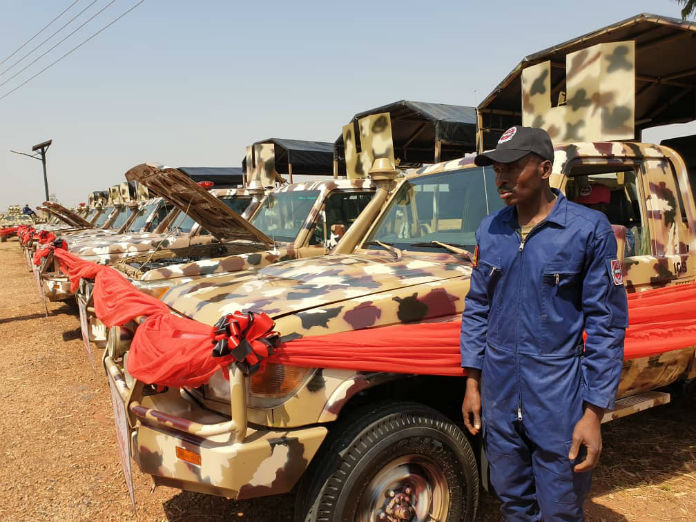GMSC 2019 Communique (Details)
The Global Maritime Security Conference, was held in Nigeria from 7-9 October, 2019.
Below is the details of the communique read out by Dr Dakuku Peterside, the Director General of the Nigerian Maritime Administration and Security Agency (NIMASA), who was flanked by other maritime security stakeholders.
COMMUNIQUE FOR THE GLOBAL MARITIME SECURITY CONFERENCE 2019
1. In view of the reported incidents of insecurity in the GoG, the interconnectedness of the maritime environment and the shared responsibility for effective ocean governance and maritime security, the Federal Ministry of Transportation in conjunction with Nigerian Maritime Administration and Safety Agency and the Nigerian Navy organised a Global Maritime Security Conference, on behalf of Nigeria and the Gulf of Guinea, between 7 – 9 October 2019 at the International Conference Centre, Abuja.
2. The Conference was attended by international, continental and regional maritime institutions and stakeholders as well as representatives from over 80 nations. The 3-day Conference featured deliberations on 11 thematic panels where experts led discussions and proffered solutions options on a wide spectrum of maritime security and development issues in the region. During the Conference a number of observations were made on 4 major clusters of issues to an amenable regional maritime environment. These were:
a. The legal/policy/regulatory framework for maritime security.
b. The institutional framework and capacities.
c. The material, human, financial, technological and other resources needed to enhance security in the GoG.
d. The ways and means of implementing the necessary strategies for enhanced maritime security in the region.
3. In view of these observations, the Conference resolved as follows:
a. States of GoG and her international partners should give priority attention to training and capacity building for relevant stakeholders involved in maritime security including national maritime authorities, law enforcement agencies and navies as first responders.
b. Navies/Coast Guards and maritime law enforcement agencies in the GoG states should engage in regular joint maritime operations, including with international partners, to harmonise operational procedures, training standards and foster interoperability.
c. GoG States should explore the possibility of designated maritime courts to handle cases of sea robbery, piracy and other maritime offences to ensure quick dispensation of cases in addition to capacity building and sensitization of judiciary on crucial relevant legislation.
d. GoG States should put more efforts to implement various agreed strategies at the continental, regional and national levels.
e. GoG States with the support of regional organisations like the ECOWAS, ECCAS, ICC and relevant international organisations should continue to ratify and fully domesticate the provisions of the relevant international conventions including UNCLOS 1982, SUA and Port States Measures Agreement.
f. GoG countries should explore alternative and innovative sources of funding for their maritime security and law enforcement agencies to enhance the effectiveness of their response to maritime incidents.
g. GoG States should establish repeatable, documentable frameworks for interagency cooperation.
h. GoG states are encouraged to strengthen mechanisms and structures for engagement with the local communities, fishing communities and seafarers including private stakeholders for economic benefits.
i. GoG States should strengthen, including funding, national, zonal and regional maritime domain awareness centres to enhance information sharing and coordination.
j. GoG States are encouraged to sustain regular meeting of heads of states, heads of navies/coast guards and other maritime enforcement agencies on issues of maritime security for mutual benefit.
k. Relevant regional maritime agencies should engage industry experts/representatives for informed policy decision on maritime security and related issues.
l. GoG States should promote strategic communications initiative to enhance awareness on maritime security concerns and potential benefits.
m. GoG States should engage in maritime spatial planning of coastal and urban areas to ensure that maritime security vulnerabilities are not created particularly in proximity to critical maritime infrastructure.
n. GoG States should explore opportunities for maritime law enforcement through targeted engagement with coastal and fishing communities to support maritime security efforts.
o. GoG States and the international community should put mechanisms in place to ensure that resources that are illegally harvested/explored in the GoG, including stolen oil and Illegal Unreported and Unregulated Fishery, are intentionally banned as was the case with the “blood diamonds”.
p. Conveners of this Conference in liaison with ECOWAS, ECCAS, ICC should constitute a GMSC expert working group to drive the implementation and decisions arising from the Conference.
q. The Honourable Minister of Transportation of Nigeria should communicate the decisions and recommendations of this Conference to the Presidency of Nigeria and onward to ECOWAS, ECCAS, GGC, AU, IMO and other international partners.
DR. DAKUKU PETERSIDE
Director General/CEO NIMASA
October 2019




